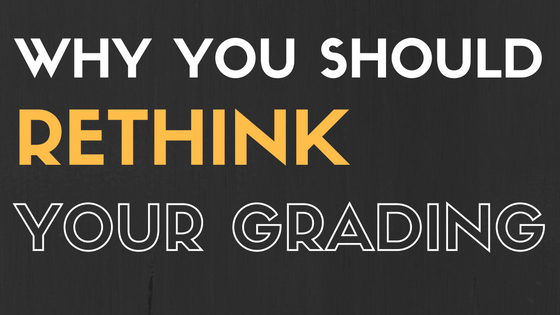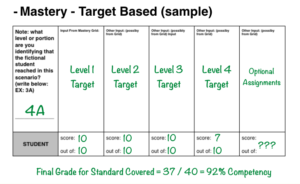Ask yourself: What are we grading for?
During our workshops, grading is one of the topics most commonly brought up. We as teachers have an obsession (and rightly so) with how any activity, instructional method or new tactic fits into that little book (or software) where we calculate student grades.
If you think about it, grades mean so much to teachers because, a lot of times its what we are being graded on. I’ve never heard a parent thank a teacher for assessing a student as earning an “F” in their class. I have, however, heard a lot praise for teachers who have high numbers of passing students.
So what’s in a grade?
Participation? Homework? Tests? Projects? Behavior? (I hope not!)
I think every teacher has their own formula for how things all add up. To me though, grading shouldn’t include any of the things I just mentioned. Not one of those things should make it into your grade book for one very simple reason…
None of those things articulate what the student actually knows.
When you place something in the columns of your grade book it should tell you one thing, and one thing only; the level at which your learner understands or has mastered a topic, learning target, objective, or skill. You should be able to take a single look at your grade book and know exactly what a student can and can’t do with the knowledge being assessed or graded.
In order to accomplish this, I utilize a learning target based grade book.
- I break down all of my standards into tiered levels based on Webb’s Depth Of Knowledge. This allows me to identify and align appropriate tasks for each target.
- I then allow my students to use multiple attempts and multiple learning opportunities to prove or show understanding or mastery.
- When I provide a score for any given target, it represents a culmination of knowledge not an individual task or operation.
- Below is a simplified example of my grade book.
Note: This image is based off of an example using the mastery based system I developed but the concept of grading remains the same.
When you make your grade book mean something to both you and the learner, it becomes a powerful weapon and an amazing discussion tool when meeting with students and parents.
I know it’s scary, but loosen your grip on that spiral bound grade book and unleash its power for you, your learners, and all stakeholders in their education.
After reading this I want you to ask yourself a very important and serious question: What am I grading for?


